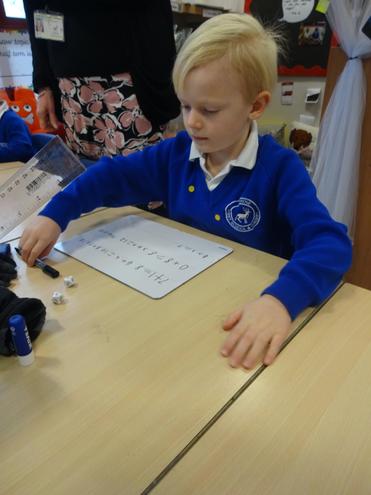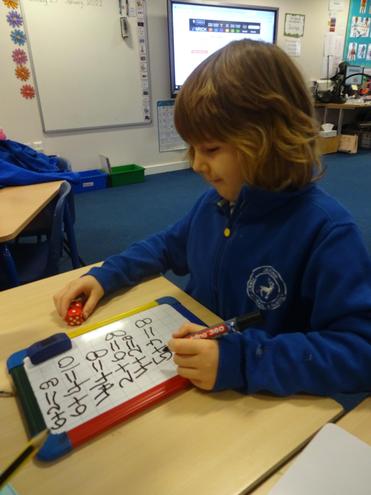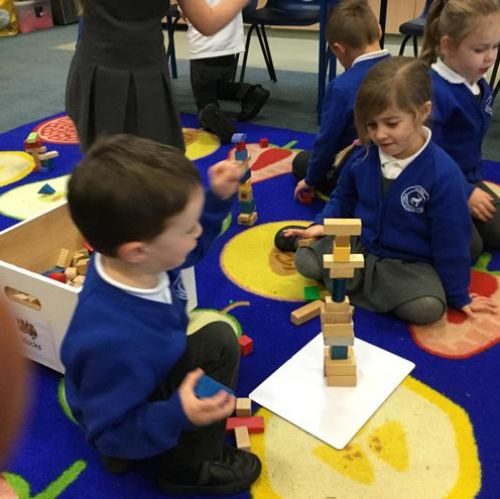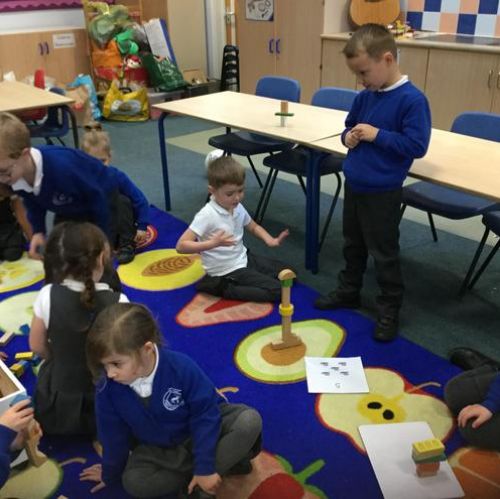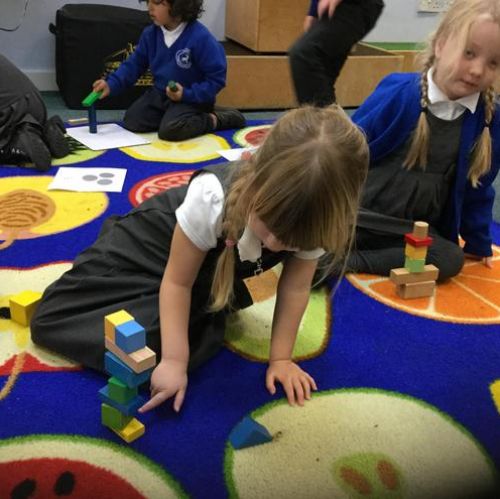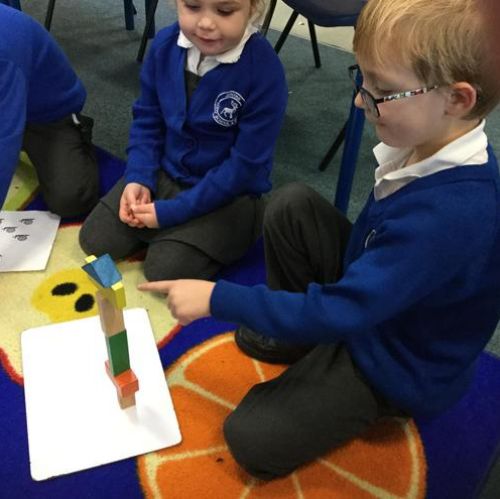Maths
Early Years- Counting and exploring cardinality and conservation of number
Intent
Children need to experience Mathematics in a variety of situations - as part of a dedicated lesson (Mathematics) and in other areas of the curriculum, in practical tasks and in real-life everyday problems; it can be used to describe, to illustrate, to interpret, to predict, to explain and to convey meaning. In this way, the children will come to realise that Mathematics is an essential part of their lives and can be a way of communicating their experience and knowledge. It is our aim that they will be equipped with the skills necessary to use their mathematical understanding in their everyday life both in and outside school.
Teaching and Learning- We believe that a strong emphasis on practical work is essential. Children are taught using concrete ideas and are encouraged to use manipulatives in their maths lessons. They develop the ability to use pictures and jottings and other representations to help them solve mathematical problems and develop the skills necessary to consider more abstract ideas and use of mathematical symbols. This concrete, pictorial, abstract (CPA) approach supports mastery of mathematics. Carefully planned small steps in learning enable the children to have a deep understanding upon which to build. Children can reach a high level of independence whilst exploring different situations and this approach is continued, as the child gets older. The exploratory method of learning is encouraged, including finding mental and written strategies at all levels. The children will not attempt formal methods of calculation until they understand the practical application. Children will be able to identify errors, as they can roughly estimate what answers to expect.
Reasoning- We consider Mathematical conversations to be vitally important. Correct use of mathematical vocabulary should be modelled by all staff and children should be taught to develop their mathematical vocabulary by using speaking frames as scaffolds. Reasoning skills are essential tools for the formation and expression of mathematical ideas. Quality teaching encourages the children to make connections and links and to notice patterns in their experiences. It encourages the children to evaluate their findings and to question. Quality teaching and the use of speaking frames will equip children to make predictions by generalising and by testing their theories to draw conclusions. Ultimately, we wish the children to justify by providing simple reasons for their opinions based on what they know.
Using and applying Mathematics- This is seen as an integral part of our teaching approach, by open-ended questioning or asking children to explain concepts or the rules of a game to others. Problem-solving activities and investigations are carried out on a regular basis throughout the school. Children are given opportunities to use their curiosity and inventiveness to find out about ideas, which are important to them, and to use these either as a starting point or to develop their work further. They are encouraged to work cooperatively, and to be independent and flexible.
AIMS
Our aim as a school is to make children competent mathematicians who can make connections between different mathematical ideas and have the confidence to transfer knowledge to new situations by developing a mastery approach to mathematics. These areas of Mathematics include;
Using and applying Mathematics, Counting and understanding number, Knowing and using number facts, Calculating, Understanding shape, Measuring, Handling data.
We will follow the patterns of teaching as laid out in the National Curriculum for Mathematics 2014:
- Number and place value
- Addition and subtraction
- Multiplication and division
- Fractions (including decimals and percentages)
- Measurement
- Geometry: properties of shapes
- Geometry: position and direction
- Statistics
At Jenyns School we aim to help the children to develop:
- a positive attitude to Mathematics and number work - children need to be motivated and stimulated to be enthusiastic
- an ability to reason and express ideas fluently, using the language of mathematics, specifically by making connections, evaluating, generalising, drawing conclusions and justifying.
- practical skills, knowledge and understanding necessary for everyday life and future employment, including the quick recall of basic facts
- an awareness of the uses of Mathematics in the world beyond school
- an ability to think logically, clearly and systematically - estimating, considering alternatives and reviewing progress
- confidence in handling mathematical ideas and information - encouraging independence and flexibility as they look for their own ways to solve problems or complete tasks. They should be able to collect materials without fuss and be prepared to try something unfamiliar without immediately seeking assistance
- an ability to work cooperatively - working together on a common task, each child making a contribution e.g. surveys, investigations - presenting it to the class
- a growth mindset and a readiness to self-challenge
- an understanding of Mathematics through a process of enquiry and experiment
- an appreciation of mathematical pattern and relationships
- an effective use of Mathematics as a tool - using it across the curriculum wherever relevant
- good habits in the use of manipulatives, computers and other resources
Implementation
Once pupils have progressed from the ELGs by working within the Early Years Foundation Stage framework the programme of learning will be consistent with the National Curriculum for Mathematics.
Throughout the school we have daily Mathematics learning. In KS 1 and 2 this is a daily Mathematics lesson. In EYFS there are four lessons each week with mathematical activities available during Child Initiated Learning for children every day. Pupils will be provided with a holistic programme of learning opportunities, which encourages using and applying Mathematics to problem solving activities, open ended questioning where the children are active learners. Activities are differentiated to offer challenge to all pupils.
Pupils work in a variety of ways – individually, in pairs/groups (working cooperatively), and as whole classes. A controlled, working atmosphere is expected and relevant discussion encouraged. We promote a mastery approach to learning maths building a secure understanding of maths through small carefully planned, progressive steps.
Classroom working walls and school displays will be used to support learning and to celebrate pupils’ achievements.
Mastering Number and fluency will be taught systematically as the children move through the school. Each half term the children will focus on learning new facts to support their fluency in lessons. These will be shared with parents, and they will be learnt during timetabled sessions each week at school and at home.
Home Learning
When mathematical home learning is set in KS1 and 2, tasks are set on Google Classroom and children are encouraged to use TT Rockstars regularly. Tapestry will be used to share ideas in EYFS. Periodically whole school home activities are shared with parents for example on Number Day and during Maths week. This raises the profile of mathematics. We encourage parents to be involved in their children’s learning and to support them to recognise the relevance of Mathematics beyond the classroom setting by involving them in home learning opportunities. Activities will extend and consolidate mathematical skills which have been introduced at school. The children will be asked to practise recalling their tables gradually from KS1 (2s, 5s and 10s) and more formally in KS2 so that by the end of Year 4 they are familiar with all tables up to 12 X 12 and are prepared for the Multiplication Tables (MTC) Check.
Written calculations
More formal written calculations will be introduced during Year 1 and they will begin to be adopted by pupils. Prior to this, children are encouraged to explore their own ways of recording mathematical calculations.
Impact
This is measured through the following assessment, record keeping and reporting:
Assessment
Formative Assessment
Within EYFS, KS1 & KS2 a combination of informal observations, notes and photographic evidence can be used and will drive judgements on how the lesson or next part of the learning sequences may need to be modified when misconceptions or insecure learning are identified.
Summative Assessment
Assessments include the White Rose tests, and those from the document Mathematics guidance: key stages 1 and 2 non-statutory guidance for the national curriculum in England June 2020 are available to support this
https://assets.publishing.service.gov.uk/government/uploads/system/uploads/attachment_data/file/1017683/Maths_guidance_KS_1_and_2.pdf. These will be used/recorded termly and will feed into future planning. End of KS assessments are made at the end of the reception year and year 2. Year 4 will take part in the MTC towards the end of the school year. Each child’s attainment for Mathematics is tracked and monitored in respect to age-related expectations. Class teachers keep records of their pupils’ progress which are passed onto the next teacher. Pupil Progress will be monitored and interventions for groups of children will be organised to accelerate learning of those who are not making expected progress. These assessments are also kept in the cohort files. We report each child’s Mathematics progress at parent consultations in the Spring term and annually in their school report.
-
NRICH
Maths games
-
Top Marks
Maths games
-
BBC Bitesize maths games
maths Games
-
ictgames
Maths games
-
TT Rockstars
times tables practice game
-
Numbots
Number fluency games
Maths in Action
